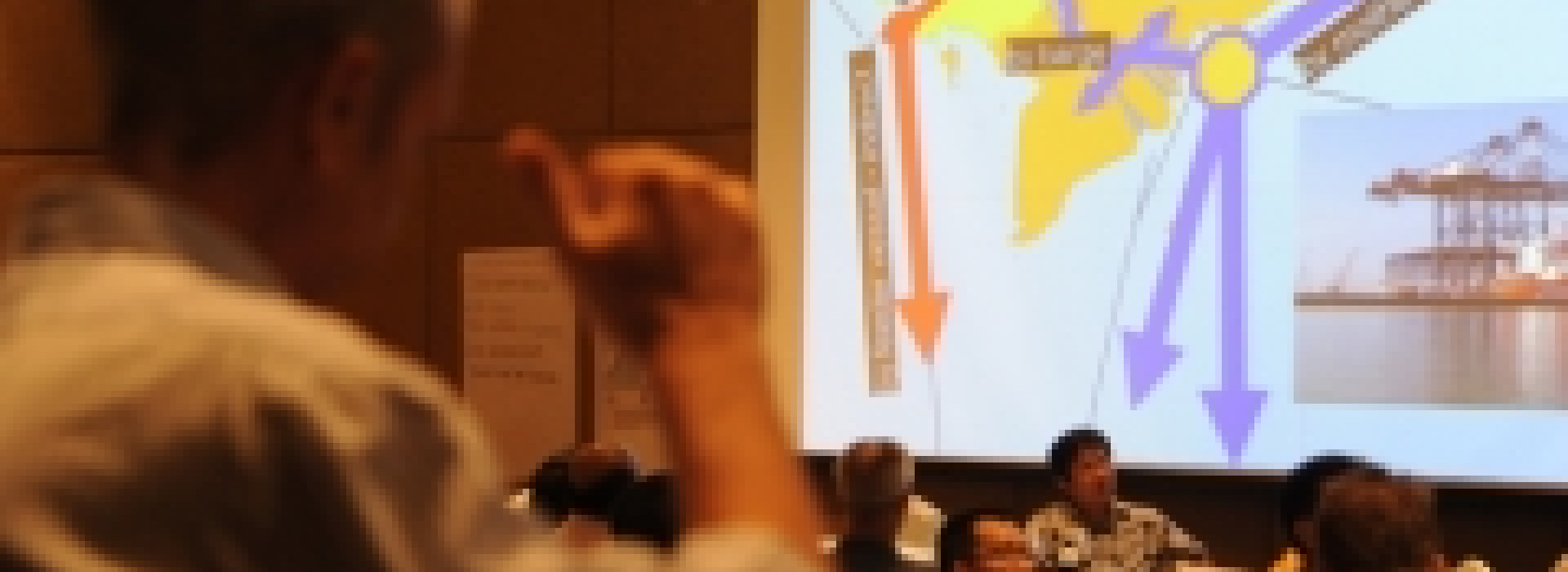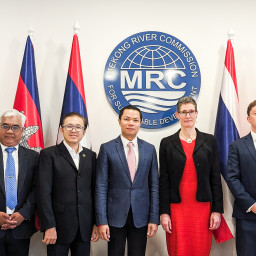MRC stakeholders call for joint development to address impending challenges and risks in the region
21 November 2014, Siem Reap, CAMBODIA—The Mekong River is globally important and complex and is ripe for balanced joint development that reduces risks, enhances benefits and protects the environment. These were some of the key messages from the Mekong River Commission’s basin development planning regional forum.
Under the theme Moving towards optimal development of the Mekong River Basin, the 4th Regional Forum on the Basin Development Strategy discussed pressing issues that affect development in the Mekong region including hydropower development, regional benefit sharing, climate change, food security and transboundary cooperation. The forum aimed to collect feedback from stakeholders to update the basin development strategy which will guide the actions of the Member Countries and other relevant actors to promote cooperation, improve national development planning, address key gaps in knowledge and strengthen basin management procedures.
At the end of the two-day gathering, participants stressed the importance and high complexity of the Mekong River, which creates significant risks due to population growth and climate change, but also create great opportunities. They called for adequate assessment and mitigation of these risks because solutions will become much more difficult and costly with time and continued uncoordinated development.
Stakeholders agreed that adequate information exists to reap the benefits of joint development and that cost and benefit sharing deals will soon be necessary to fulfill the long-term aspirations and potential of the Mekong population. Early action is possible due to the MRC’s significant investment in data and knowledge, which makes the Lower Mekong Basin more prepared than most basins that have already reached such deals.
During the forum the representative from China, one of the MRC’s upstream Dialogue Partners, made a clear commitment to continue and strengthen regular communication, information sharing and technical exchanges, all crucial aspects of the relationship with its downstream neighbours.
Negotiation, information sharing, trust and adaptation were identified as essential elements in the optimal and sustainable development of the region.
Participants called for the MRC to promote broad-based stakeholder engagement to examine development options, costs, benefits and trade-offs that may need to be considered by riparian governments.
It is intended that the outcome of the forum will be useful in the finalisation of the MRC’s updated basin development strategy as well as in future policy-making.
The updated strategy seeks to address challenges and assist the countries in cooperating and managing the basin effectively in light of future needs.
More information on the forum including an overview, format and programme, is available on the following link: http://www.mrcmekong.org/news-and-events/events/4th-bdp-regional-forum-on-the-basin-development-strategy/. Those interested in submitting their feedback for the development of the Basin Development Strategy can do so by clicking on following link:
Notes to editors:
The Mekong River Commission is the intergovernmental body responsible for cooperation on the sustainable management of the Mekong Basin whose members include Cambodia, Thailand, Laos and Viet Nam. It was established to promote cooperation among its members and thus it is not a supranational or regulatory body.
The MRC is the intergovernmental body responsible for cooperation on the sustainable management of the Mekong Basin whose members include Cambodia, Lao PDR, Thailand and Viet Nam. It is established to promote cooperation amongst the Member Countries and thus it is not a supra-national or regulatory body.
In dealing with this challenge, the commission looks across all sectors including sustaining fisheries, identifying opportunities for agriculture, maintaining the freedom of navigation, flood management and preserving important ecosystems. Superimposed on these are the future effects of more extreme floods, prolonged drought and sea level rise associated with climate change. In providing its advice, the MRC aims to facilitate a broad range of dialogue among governments, the private sector and civil society.
The MRC Secretariat provides technical, advisory and administrative services to the member states. It facilitates regional meetings of the Member Countries and provides technical advice on joint planning, coordination and cooperation. It also works closely with the four countries’ coordinating bodies, the National Mekong Committees (NMCs), and other state agencies. Currently, the People’s Republic of China and the Union of Myanmar are engaged as MRC Dialogue Partners.
-END-





